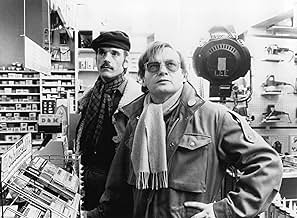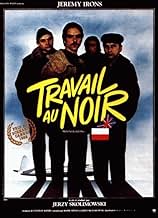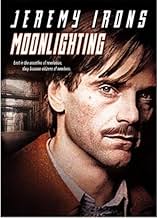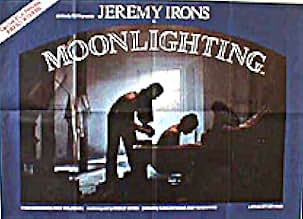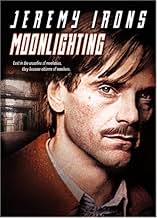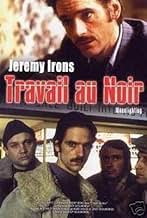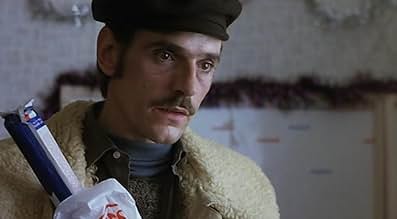Adicionar um enredo no seu idiomaNowak (Irons), a Polish contractor, leads a group of workmen to London so they can provide cheap labor for a government official based there. Nowak must manage the project and the men as the... Ler tudoNowak (Irons), a Polish contractor, leads a group of workmen to London so they can provide cheap labor for a government official based there. Nowak must manage the project and the men as they encounter the temptations of the West and loneliness and separation from their families.... Ler tudoNowak (Irons), a Polish contractor, leads a group of workmen to London so they can provide cheap labor for a government official based there. Nowak must manage the project and the men as they encounter the temptations of the West and loneliness and separation from their families. Nowak is the only one of the group who speaks English, and he uses this as a tool over hi... Ler tudo
- Direção
- Roteirista
- Artistas
- Prêmios
- 3 vitórias e 3 indicações no total
- Wolski
- (as Jirí Stanislav)
- Builders' Merchant
- (as Mike Sarne)
Avaliações em destaque
The story is about four Poles who come to London to work under the table rehabbing an apartment. Why? Well, Polish workers work for a lot less money than English ones and as long as they aren't caught, the scheme will pay off well for everyone. But only one of them (Jeremy Irons) speaks English and the rest spend much of the movie like the Darryls ("Newhart") or Harpo Marx...saying absolutely nothing. As the movie progresses, the more you see that this spokesman is very manipulative...and a most unusual character study of the man.
The story is told VERY economically...with little traditional incidental music and no fancy sets. It looks more like a high quality home movie than a big-time production. I am sure many will dislike the starkness and slow pace of the movie as well as the lack of emotion in the characters. They mostly seem depressed...which is understandable considering what eventually occurs in the picture. But it also makes viewing the film anything but fun.
Overall, this is an okay film which I didn't enjoy nearly as much as Siskel or some of the other reviewers did. Worth seeing? Perhaps...but not if you want a fun or traditional style movie.
A bunch of Polish builders arrive in London to renovate a house belonging to their boss. The foreman, Nowak, played quietly and brilliantly by Jeremy Irons, is the only one that speaks English. Their money is sufficient only for the tools, building materials and barely surviving.
This is a slow-burner film with every face hiding a deep anxiety, anger or fear, it's a wonderful experience for those who can appreciate true cinema. Irons carries the film single-handedly (often with inner monologue, since there are not many people to talk to) with few facial expressions but each one telling books of emotions.
You can literally taste the frustration of every character: the builders, working hard but not able to enjoy the western life that they finally see but cannot touch, are angry. (There's a very funny scene where one of them wants to buy Coca Cola on their first trip to the supermarket, exclaiming "Coke!" with childish glee, but their money is so limited that they can't afford even that.) The neighbors are angry, because the builders make too much noise. Most of all, Nowak is angry for a lot of reasons, although he never shows it: He misses his wife, and has growing doubts about the intentions of his boss about her. He speaks English, but doesn't always understand the subtleties of what the British people say. He has to deal with the men, the meager finances, the neighbors, the skip workers, and of course the house itself, which looks like it will come down if someone sneezes hard.
Two things change the course of their dull days dramatically: the money obviously won't last, and Nowak starts to come up with little schemes to get extra food from the supermarket using the same receipt. He's quite inept, but lady luck is often on his side. But most importantly, he hears that a military coup has taken place in his homeland. He faces a terrible dilemma: does he tell the men? He must, since they all have families at home, but then the work will never finish, and they really need the income. (There's no way they'll be allowed back, anyway) Or does he not tell them? Then the work may finish on time, but how will he keep the men from finding out themselves, when their weekly phone calls from home suddenly stop?
It's basically a hero story. What's a hero? A Marvel guy in leotards, speaking in one-liners? Or a man who does the right thing, at his own cost, knowing that he will never be appreciated? Nowak does the right thing. He hides the truth about the coup, thus keeping the men from rushing to the border and probably getting arrested. He gets the work done on time. He sees attractive women, but never chases them: they only remind him of how much he loves and misses his wife. He steals, but not from regular people: he only steals from the supermarket, and steals food and basic necessities only. And all the while he keeps his mouth shut. He doesn't "share his journey" or any other nonsensical stuff we love oh so much nowadays. He doesn't expect rewards, admiration, medals, approval, praise. He does the right thing, because he's a man, and that's what a man does. Even the final scene, where he tells the men about the coup and gets beaten by them for hiding the truth so long, is a tribute to this: He doesn't try to justify it, he knows he did the right thing but also hurt his men, so he takes their punches like a man.
As one other reviewer mentioned, it's a movie for the discerning viewer. There's nothing wrong with Marvel movies or action movies, but there's a lot wrong with thinking that's what movies are all about.
On the surface, the story is rather simple: sometime in the early 80's, during the political turmoil that was occurring in Poland, a group of Polish workers emigrate to London to renovate an apartment for their boss. They have no working permits, so they have to do their job with as much secrecy as possible. When Novak (Jeremy Irons), their English-speaking foreman, discovers that military law has been declared in their homeland, he tries to keep it a secret until they are allowed back into the country.
This may not seem like much of a story compared to most modern thrillers. There are no police out to get Novak and his men, nor are there any political opponents out to assassinate them. They are simply there to do their job, and Novak has to make sure they do it effectively and on time. Small but crucial subplots develop out of this: in order to feed himself and his men, Novak has to fake receipts for food (due to the limited amount of money they brought with them), and there are several scenes where he tries to get past the clerks at a grocery store with a Christmas turkey. He also has to buy them clothes and fulfill some of their material demands. On top of that, he also begins to develop fears and worries about his wife back home, including the suspicion that his boss may be having an affair with her. As the story progresses, Novak's money runs lower and his fear and paranoia grows stronger.
Because he is the only one of them who can speak English, Novak is the only one who can communicate with the outside world. But he is also very manipulative, and serves as a symbol of a government that misled their people and kept them ignorant of many of their own problems. It is interesting to see how Skolimowski develops sympathy for poor Novak; for all his intelligence, he is still nothing more than a pawn in the hands of a corrupt government. He is a stranger in a strange land, lost and faking his knowledge of his whereabouts. It would have been difficult to make this film convincing had the lead role not been played to perfection, but Jeremy Irons does it with more grace and skill than any other actor possibly could. Much of his performance is spent in narration, subtly explaining his growing confusion and terror. There are several moments where he keeps a perfectly straight face while rambling on in his head about the grave situation he is in. His performance here holds its own in a year that also included Dustin Hoffman in "Tootsie," Ben Kingsly in "Gandhi," Gerard Depardieu in "Danton," Paul Newman in "The Verdict," Jurgen Prochnow in "Das Boot," and Jack Lemmon in "Missing."
Like Andrej Wajda (who made "Man of Marble" and "Danton"), Jerzy Skolimowski was an outspoken critic of Poland's communist regime. Curiously, he wrote the script in only a little over a day, and the whole production of the film took only a matter of months. Furthermore, the three Polish workers accompanying Novak in the story were actual Polish emigrants living (legally) in Skolimowski's home at the time military law was declared. "Moonlighting" won a well deserved screenplay award at Cannes and was nominated for the Palme d'Or.
This film is on video, but I do not think it is still being circulated. I hope they re-release it on video or DVD someday.
Trying to figure out HOW he will get the job done and WHY he is going to such great lengths and pains becomes all consuming mental and emotional puzzles as you become sucked into this well written story and tour de force performance by Jeremy Irons. By the second half of the film, you can't bare to watch but can't stand to look away. (It's as if you meant to eat only a few peanuts to suddenly discover you've consumed the entire amount and didn't even notice) I think this film is best described as "Escapism" rather than "Enjoyment" but either way you won't be focused on anything else while you're watching it. In fact the "taste" of it lingered with me for days after I saw it. It's full of a quiet yet constantly building tension, with a capital 'T'. No car chases, big explosions, explicit sex, swearing or violence. Just a well constructed screen gem that seemed to have fallen through the cracks when it was released in the early 1980's.
Você sabia?
- CuriosidadesSkolimowski's Kensington house in West London was in real life undergoing renovation at the time the film was made. (Moonligthing, 1982)
- Erros de gravaçãoWhen one of the workers paints the door frame on the outside of the building and clears away the electrical wire, part of the lintel is already painted white. Later, when Banaszak climbs up the ladder, the lintel has not yet been painted. Then, in the close-up in which he gets the electric shock, a good part of the lintel is painted white again, and in the next shot, when he falls off the ladder, only a tiny part is painted white again.
- ConexõesFeatured in At the Movies: The Best Films of 1982 (1983)
Principais escolhas
- How long is Moonlighting?Fornecido pela Alexa
Detalhes
- Data de lançamento
- País de origem
- Idiomas
- Também conhecido como
- Vivendo Cada Momento
- Locações de filme
- Empresas de produção
- Consulte mais créditos da empresa na IMDbPro
Contribua para esta página


